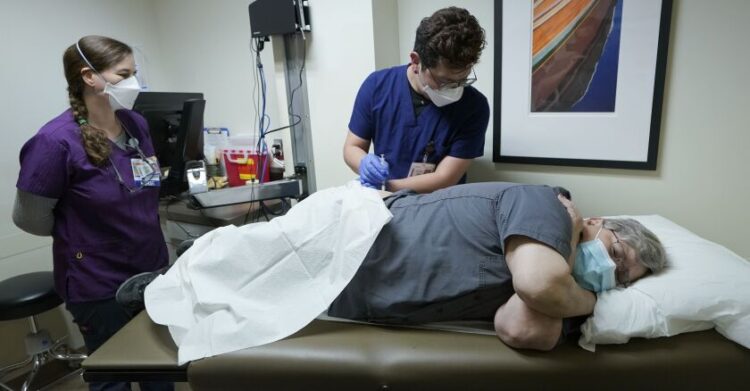By Emily Caulkett-
A new medicine, Evusheld (tixagevimab/cilgavimab), has today been authorized for COVID-19 prevention by the Medicines and Healthcare products Regulatory Agency (MHRA) after meeting the UK regulatory standards of safety, quality and effectiveness.
The decision to grant approval for this treatment was endorsed by the government’s independent expert scientific advisory body, the Commission on Human Medicines, after carefully reviewing the evidence.
The antibody cocktail, made by AstraZeneca, will be used for immunosuppressed people who are less likely to get strong protection from vaccines. There are believed to be around 500,000 Britons who could benefit from the drug.
The UK Medicines and Healthcare products Regulatory Agency (MHRA) revealed its review found Evusheld provided ‘long-lasting protection’.
The MHRA’s approval means the NHS can now negotiate a price with the drugmaker and decide who should be eligible.
The watchdog said it was unsure how well it will work on Omicron or the now-dominant BA.2, with officials suggesting a higher dose might be ‘more appropriate’ for these variants.
Evusheld is administered via two injections at the same time and uses antibodies — immune proteins — that have been modified in a lab to make them last longer.
Although vaccines train the body to muster its own response to Covid, the drug skips this process and makes the antibodies readily available.
Evusheld was found to drastically reduce the risk of getting symptomatic Covid by around 80 per cent for up to six months in a clinical trial last year.
A six-month study last year found the drug provided 77 per cent protection against falling ill with Covid after six months in unvaccinated vulnerable people.
At the time, when the Delta variant was dominant, it represented even higher efficacy than two vaccine doses, which wane significantly in six months.
But there are questions about how well the antibody cocktail will perform against Omicron and its subvariant BA.2, which are more resistant to antibodies.
The Government’s independent advisory body, the Commission on Human Medicines, has endorsed the drug’s approval.
Its chair, Professor Sir Munir Pirmohamed, said: ‘We have carefully reviewed data on the medicine’s safety, quality and effectiveness and are satisfied it meets the expected standards.’
In some patients, such as those on chemotherapy, their immune systems are so weak that even after vaccination they struggle to mount a response.
Dr June Raine, chief executive of the MHRA said: ‘After a careful review of the data, I am pleased to confirm we have authorised another medicine to help protect against the effects of Covid.
Developed by AstraZeneca, Evusheld is a combination of two long-acting antibodies that works by binding to the spike protein on the outside of the SARS-CoV-2 virus, the virus that causes COVID-19. This in turn prevents the virus from attaching to and entering human cells.
Evusheld is authorized to be used before being exposed to the risk of COVID-19 infection in order to prevent disease (known as ‘pre-exposure prophylaxis’). Evusheld has been approved for use in adults who are unlikely to mount an immune response from COVID-19 vaccination or for whom vaccination is not recommended.
A single dose of the two medicines, tixagevimab and cilgavimab, are recommended as two injections into a muscle by a healthcare professional.
In a clinical trial in adults, Evusheld was found to reduce the risk of developing symptomatic COVID-19 by 77%, with protection from the virus continuing for at least 6 months following a single dose.
There is not yet enough data to know how effective Evusheld is against Omicron or the duration of its effect against this variant, and the MHRA will work with the company to establish this.
Dr June Raine, MHRA Chief Executive said:
“After a careful review of the data, I am pleased to confirm that we have authorised another medicine to help protect against the effects of COVID-19.
“Evusheld is a “pre-exposure prophylaxis” treatment, meaning it is taken to prevent COVID-19 before the risk of acquiring infection. One dose has been found to provide long-lasting protection against this disease for up to 6 months.
“While the COVID-19 vaccines continue to be the first-line defence against COVID-19, we know that some people may not respond adequately to these vaccines and for a small number of individuals COVID-19 vaccines may not be recommended for other reasons, such as a previous allergic reaction to one of the vaccine ingredients.
“For these people, Evusheld could provide effective protection against COVID-19.”
Professor Sir Munir Pirmohamed, Chair of the Commission on Human Medicines, said:
“The Commission on Human Medicines and its COVID-19 Therapeutics Expert Working Group has independently reviewed the data and endorses the MHRA’s regulatory approval of Evusheld.
“We have carefully reviewed data on the medicine’s safety, quality and effectiveness and are satisfied it meets the expected standards.
“The recommended dosage is 300 mg of Evusheld but a higher dose of 600 mg may be more appropriate for some COVID-19 variants. All this is outlined in the Summary of Product Characteristics.
“Pre-exposure prophylaxis with Evusheld is not a substitute for vaccination in individuals for whom COVID-19 vaccination is recommended.”




